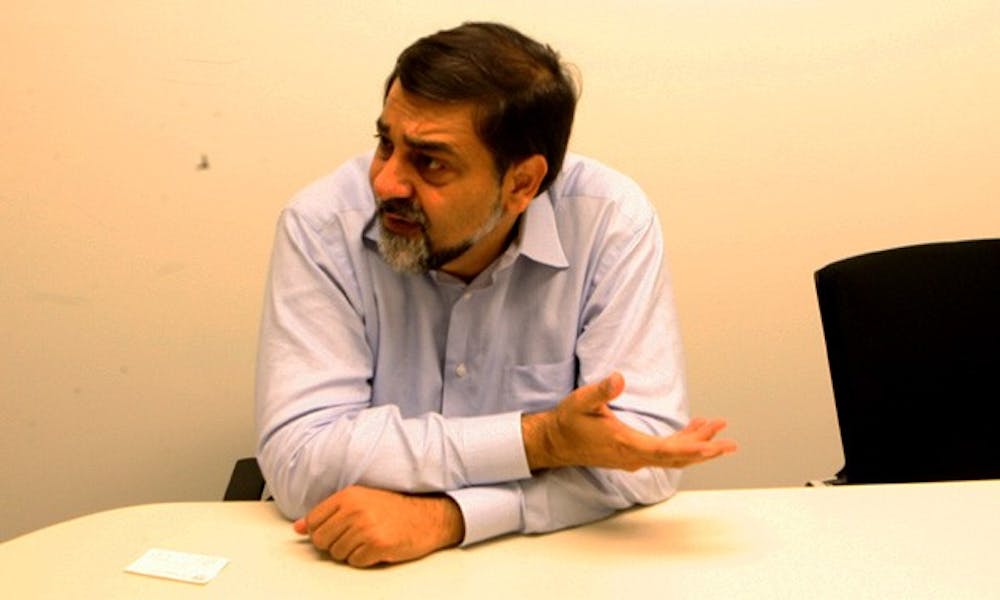Named a “Leader of Tomorrow” by Forbes.com and the founder of a company that Fortune Magazine lauded as one of the top 25 “coolest” companies in the world, Vivek Wadhwa is a well-respected veteran in the business world. Wadhwa now researches the “Global Education Race” phenomenon and is an executive in residence and director of research for the Center for Entrepreneurship and Research Commercialization at Duke and a senior research associate at Harvard Law School. Wadhwa studies America’s competitive advantages, especially entrepreneurship, skilled immigration and university research commercialization. The Chronicle’s Anne Yeung spoke with Wadhwa about his thoughts on the “Global Education Race.”
The Chronicle: What do you mean by the “Global Education Race?”
Vivek Wadhwa: Over the last 10 to 20 years, the rest of the world has learned what makes America what it is, which is its superior education system, its entrepreneurship, the culture of openness, bringing immigrants in and so on... A lot of countries are investing massively in upgrading the education systems. China... [has] invested tens of billions of dollars in improving their universities in the past decade or decade and a half. India’s catching up, even Saudi Arabia is investing heavily in it. So, the U.S. is no longer the only destination for the world’s best and brightest.
TC: Some of your research mentions the “brain drain” as a phenomenon relating to the “Global Education Race.” What is the “brain drain?”
VW: [The United States] brought so many [workers] in on temporary visas and we didn’t have enough increase in the number of green cards that now we have more than... a million foreigners working in American companies waiting for green cards. If one of my students here at the [Master of Engineering Management] program in Pratt graduates and [wants] to stay here permanently, they have almost no chance of getting a visa or green card for 10 or 20 years—or even longer... It’s a disaster for American competitiveness because the people who could be fueling the next generation of start-ups are now going all over the world and starting companies over there.
TC: What are the implications of these phenomena for U.S. technology advancements and the U.S. job market?
VW: Fewer jobs... We’re exporting economic growth. In the next five years or so, you’ll start seeing world-class companies coming out of India and China, you’ll see Google-class companies being founded in Bangalore and Beijing, and... our graduates are going to be tempted to join those companies versus joining Silicon Valley companies.... America’s going to be left behind, the way things are going.
TC: Often cited as a reason for leaving the U.S. is that there is a lack of opportunities. Other than the visa issue, what else makes the U.S. less appealing to foreigners?
VW: Graduate students can get a better job in India or China right now than they can get here.... And your career progression is much faster in India.
TC: What do you suggest President Barack Obama’s administration do to address the problem?
VW: I’m very disappointed in the Obama administration. They haven’t focused at all on the immigration problem... things have gotten worse under the Obama administration than they were under the Bush administration. Get rid of the 7 percent [per country] cap and increase [the] 120,000 [yearly quota] to maybe 250,000... any graduate from a top university in America should automatically get a green card. Once they start working here, they end up falling in love—not only with a partner, but with the country itself—so it becomes very difficult for them to go back once they’re here.
TC: What are the forces working against these reforms?
VW: When people lose their jobs, they start blaming immigrants. Xenophobia is building in America, senators are going crazy... trying to attack foreigners, foreign companies, outsourcing and so on—never mind that American companies get most of their revenue from abroad. They’re just acting in a populist way... trying to appease the most radical elements of their electorate, which is sad.
TC: Is Duke responding appropriately to the “Global Education Race”? If not, what would be an appropriate response?
VW: Duke thinks it’s doing a lot. It’s not. I’m not satisfied with the progress I’m seeing here at globalizing—the world is changing faster than universities. The majority of [Duke international students] are going back home now soon after they graduate. I’d like to see [Duke] setting up foreign campuses more aggressively. I’d like to see them changing the curriculum to add more globalization courses.
Get The Chronicle straight to your inbox
Signup for our weekly newsletter. Cancel at any time.

